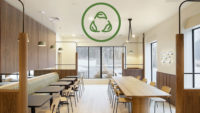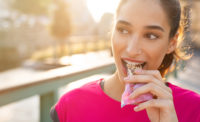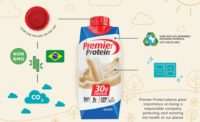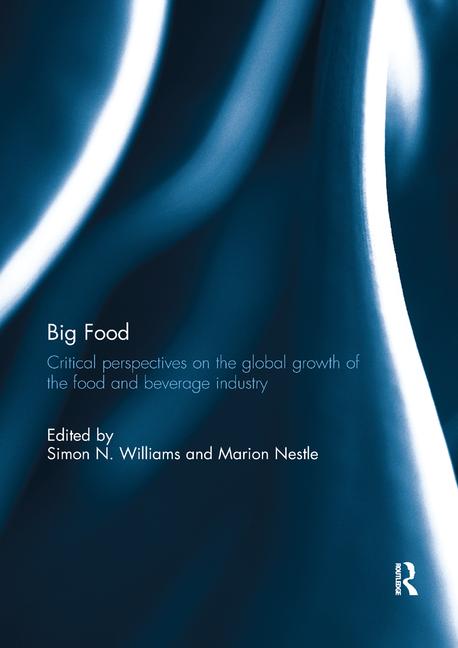SUSTAINABILITY
Food and Beverage Packaging Plays Increased Role in Corporate Sustainability Strategies
Compostable packages as well as new designs and technologies help CPG brands meet projected sustainable goals

Colorado company offers Biodegradable Products Institute Certified compostable bar wrappers
BAR-U-EAT has officially released its new Biodegradable Products Institute (BPI) Certified Compostable Packaging for its individually wrapped bars. With this release, the company now offers packaging which carries the certification for the entire package — a move that ensures that the packaging will break down properly in commercial compost systems and not contaminate the environment. It also steps leaps beyond the industry standard of single use plastics.
The new packaging is composed of plant-based materials from FSC Certified sustainably managed forests. It additionally complies with the specifications established in the American Society for Testing and Materials (ASTM) D6400 to be aerobically composted and is biodegradable.
Every year over 2 billion pre-packaged snack, protein, and energy bars are consumed, almost all of which come in single use plastics or multi-layered wrappers. This creates millions of pounds of waste from a non-renewable, non-biodegradable resource. BAR-U-EAT's new packaging being made from renewable, sustainably sourced materials can break down to become nutrient rich soil. This type of packaging is at the forefront of where sustainable packaging technology is headed and where it needs to go to combat waste and the use of finite resources.
Corporate leadership to increase R&D funding for sustainable innovation
Corporate leaders have identified a clear need to focus on technology for finding solutions to tackle global challenges and drive growth. Leading CEOs are already embedding sustainability into their businesses through launching new products and services for sustainability (63%), enhancing sustainability data collection across their value chains (55%) and investing in renewable energy sources (49%). Nearly half (49%) are transitioning to circular business models, and 40% are increasing R&D funding for sustainable innovation.
CEOs are facing an enormously challenging global context, with the vast majority (93%) experiencing 10 or more simultaneous challenges to their businesses and 87% warning that current levels of disruption will limit delivery of the UN Sustainable Development Goals (SDGs), finds the largest CEO study on sustainability ever conducted by the UN Global Compact and Accenture. While CEOs are increasingly concerned about these headwinds, nearly all (98%) agree that sustainability is core to their role, a sentiment that has grown 15 percentage points over the last 10 years of the study.
The 12th United Nations Global Compact-Accenture CEO Study draws on insights from more than 2,600 CEOs across 128 countries, 18 industries, and over 130 in-depth interviews—making this the largest-ever sampling of executives, including the biggest group of CEOs from the Global South, since the start of the CEO study program in 2007. In the study, CEOs forewarn about the impact of converging setbacks for business and society, from faltering multilateralism and socioeconomic instability to supply-chain interruptions and the immediate effects of climate change.
As these challenges stack up, CEOs point to global issues that traditionally lie outside the corporate sphere—such as climate change or socio-political conflicts—as reasons for worry over delivering value and impact for all stakeholders. With only eight years left to rescue the SDGs, nearly half (43%) of CEOs globally say their sustainability efforts have been hampered due to the geopolitical environment, with that number even higher for CEOs from developing countries (51%). When examining net zero targets set by the world’s largest companies, Accenture also found that nearly all will miss their own targets unless they double the rate of carbon emissions reductions by 2030.
Beverage packaging becoming more sustainable
Will there be paper bottles?
At the end of 2016, the Carlsberg Group presented the “Green Fiber Bottle”, their prototype for a paper bottle, for the first time. In the summer of 2020, the beverage corporation Diageo announced the first paper-based spirits bottle for Scottish Johnny Walker whisky, but so far there has been no large introduction to the market. In early 2021, for the first time in Europe, Coca Cola offered a plant-based beverage in a paper bottle to 2,000 consumers in Hungary.
The Carlsberg brewery took things a step further in 2022: The bottles for a large-scale consumer test are coated with PEF (polyethylene furanoate) an organic polymer with similar properties to PET. It acts as a highly effective barrier between the beer and the outer hull made of fibers, protects the taste and is supposed to retain the carbonic acid of the beer better than conventional PET. The biopolymer is also both compatible with PET recycling systems and biodegradable. The current prototypes are an already improved variant which features PEF coating as well as a new bottom to improve the stability of the bottle. The next generation of bottles are planned to be made available with a fiber-based lid and cap, too.
Lightweight glass bottle for multiple use
Glass is a popular packaging material for beverages. Its greatest disadvantage is only its high weight, because in direct comparison, PET bottles can be up to 90% lighter than the multiple use variety made of glass. But manufacturers of glass packaging are working on light versions, for example made of tempered lightweight glass. Reusable bottles produced this way are not only up to 30% lighter than the standard variety but they are also more resistant to abrasion, which can turn them into a real alternative both economically and ecologically. However, the thermal treatment that in the end gives the glass its greater stability limits the possibilities of product design. Variations in wall thickness present an especially difficult challenge during the process.
Alternative to plastic shrink wrap
Inside modern stretch winders, a reel of foil circles the pallet horizontally, while the goods – full cans or fragile bottles – remain static. Elastic stretch wrap is used very often, as pre-stretching the foil increases its stretchability up to 300%. Manufacturers are already working on a more sustainable solution using renewable material. For example, packaging a pallet with elastic, puncture-resistant paper is a packaging solution that can be fully recycled. For wrapping PET bottles, too, a paper-based solution that can be completely recycled has recently entered the market: a package band made from 100% kraft paper that wraps around bottles, has a high tensile strength and is able to support enough weight to secure the bottles during transport. The second part of this solution is a clamp made of corrugated cardboard that grips the bottle neck. Individual bottles can be easily separated from the package.
Intelligent caps
Freshness indicators are helpful for the beverage sector as well. United Caps and the start-up Mimica have marketed a clever cap solution that includes a freshness indicator. The “Touchcap” changes its surface from smooth to uneven when a product is no longer fit for consumption. This is possible due to a gel in a special label that can change its structure. The cap can be recycled and consists of a lid base and a closing cap. This is applied after the filling process using a special machine which, like other modules for labeling or stretch wrapping, for example, can be easily integrated into production. It is the consumer who activates the effect by opening the lid for the first time by twisting the cap. A pilot project is already underway in the UK with an orange juice brand.
interpack will take place May 4-10 in Düsseldorf, Germany.
PepsiCo introduces new packaging goal
The industry giant aims to reduce virgin plastic per serving by 50% by 2030
PepsiCo announced a global packaging goal intended to double the percentage of all beverage servings it sells delivered through reusable models from 10% to 20% by 2030. The ambition is part of PepsiCo Positive (pep+), the company's strategic, end-to-end business transformation that puts sustainability and people at the center of how the company will create growth and value.
Offering its iconic beverages in reusable packaging and on innovative platforms that eliminate the need for single-use virgin plastic is not new to PepsiCo – it has been an important element of the company's Sustainable Packaging Vision since 2018, when PepsiCo invested over $3.2B to acquire SodaStream, and expressed its commitment to a circular economy for plastics by joining the New Plastics Economy Global Commitment. Reuse is also a critical lever to meet PepsiCo's goals to reduce virgin plastic per serving by 50% by 2030 and to become Net Zero by 2040, and progress toward these goals will also be driven – in partnership with our bottlers – by increasing recycled content in our packaging.
Looking for a reprint of this article?
From high-res PDFs to custom plaques, order your copy today!







